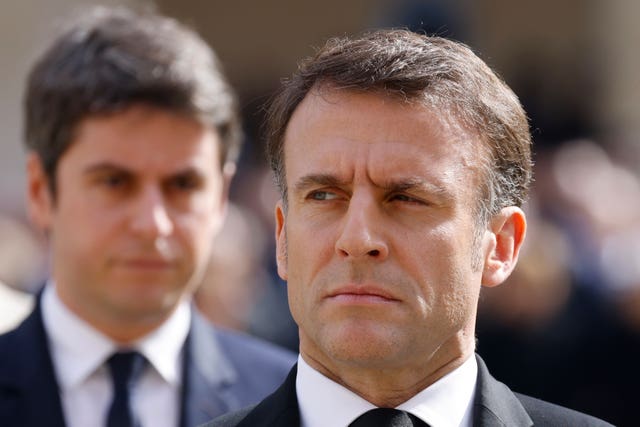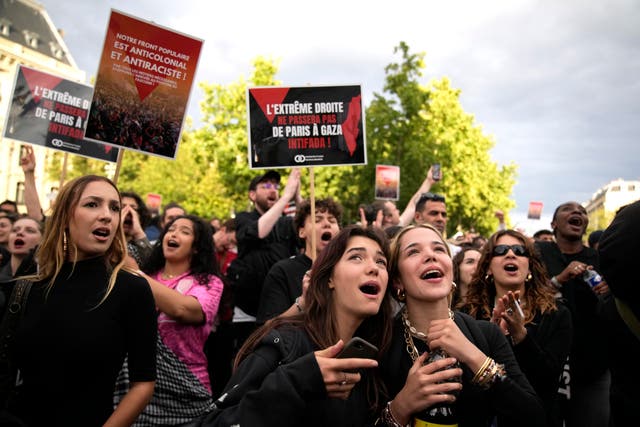Relief mixed with concern among European leaders over French poll results

Leaders across Europe have expressed relief but also some concern over the results of the snap election in France which left a key EU country facing the prospect of a hung parliament and political paralysis.
Relief, because the far-right National Rally did not come out as the strongest party, as many pro-European leaders had feared – but also concern, because no political grouping has a majority in the National Assembly.
The government in Germany, which together with France has long been viewed as the engine of European integration, expressed relief on Monday that the nationalist far right had not topped the polls.
Steffen Hebestreit, a spokesperson for German Chancellor Olaf Scholz, told reporters in Berlin: “For now, a certain relief prevails that things that we feared have not materialised.
“Only time will tell what happens with this election result, and France will decide.
“The German-French relationship is a very special one. It is certainly also the core for the fact that we are experiencing Europe in peace and freedom.”
After the first round of the French election last month, in which the National Rally had gained the most votes, Mr Scholz had spoken publicly of his worry that a second-round victory for the nationalist party could affect French-German relations.
Polish Prime Minister Donald Tusk, a former European Union Council head, sounded even more euphoric in his reaction to the election outcome.
“In Paris enthusiasm, in Moscow disappointment, in Kyiv relief. Enough to be happy in Warsaw,” he wrote late on Sunday on X.
Final results in France show that a leftist coalition that came together to try to keep the far right from power won the most parliamentary seats in run-off elections. There was high voter turnout Sunday.
President Emmanuel Macron’s centrist alliance came in second. The far right, which came in third, drastically increased the number of seats it holds in parliament but fell far short of expectations.
Several countries in the EU, including Italy, the Netherlands and Sweden, have veered to the right in national elections as voters cast their ballots for Eurosceptic parties promising nationalist solutions for European issues such as inflation, migration, and Russia’s brutal war on Ukraine that has brought in millions of refugees looking for shelter.

Some pro-European politicians warned that the French result is nothing to celebrate.
Michael Roth, a German foreign policy expert and national legislator with Mr Scholz’s Social Democrats, told daily newspaper Tagesspiegel: “The march of the right-wing nationalists and right-wing extremists has been stopped. This is to the great credit of the French.
“But it is still far too early to give the all-clear, because the nationalist populists on the right and left are stronger than ever.
“The centre is weaker than ever. Emmanuel Macron has therefore failed resoundingly.”
While it is not clear yet which party will provide the next prime minister, President Macron will still hold some powers over foreign policy, European affairs and defence, in line with the French constitution. He has a presidential mandate until 2027 and has said he will not step down before the end of his term.

Nonetheless, the French President has been weakened by Sunday’s vote and that will have repercussions for Germany and all of Europe, according to Ronja Kempin, an analyst of Franco-German relations at the German Institute for International and Security Affairs.
She said: “I think that Germany will have to adapt to the new balance of power in France.
“We have a weakened President who is much more forced to listen and react to the parliamentary majority, who can no longer act as freely as he has done for the last seven years.”
In Italy, the main ally of Marine Le Pen’s National Rally in France, far-right populist League leader Matteo Salvini, lauded her party’s overall result in parliament as its best-ever and criticised what he called Mr Macron’s “all against Le Pen” drive to deprive her party of a governing majority.
He claimed that there were “thugs attacking the police with stones” in several cities after the results were released, blaming them on “communists and social centres, pro-Islamists and antisemites”.
Mr Salvini is a junior partner in the right-wing government of Premier Giorgia Meloni and has long shared Ms Le Pen’s anti-migrant positions.
Related
A New Book Argues That What Happens in Europe Doesn’t…
Remaking the World: European Distinctiveness and the Transformation of Politics, Culture, and the Economy by Jerrold Seigel “No issue in world
Poland plans military training for every adult male amid growing…
Poland’s prime minister, Donald Tusk, has said his government is working on a plan to prepare large-scale military training for every adult male in response t
2025 European Athletics Indoor Championships: Ditaji Kambundji secures women’s 60m…
Switzerland’s Ditaji Kambundji walked away from the 2025 European Athletics Indoor Championships in Apeldoorn on 7 March with much more than her first Europea
Takeaways from the EU’s landmark security summit after Trump said…
BRUSSELS (AP) — European Union leaders are trumpeting their endorsement of a plan to free up hundreds of billions of








